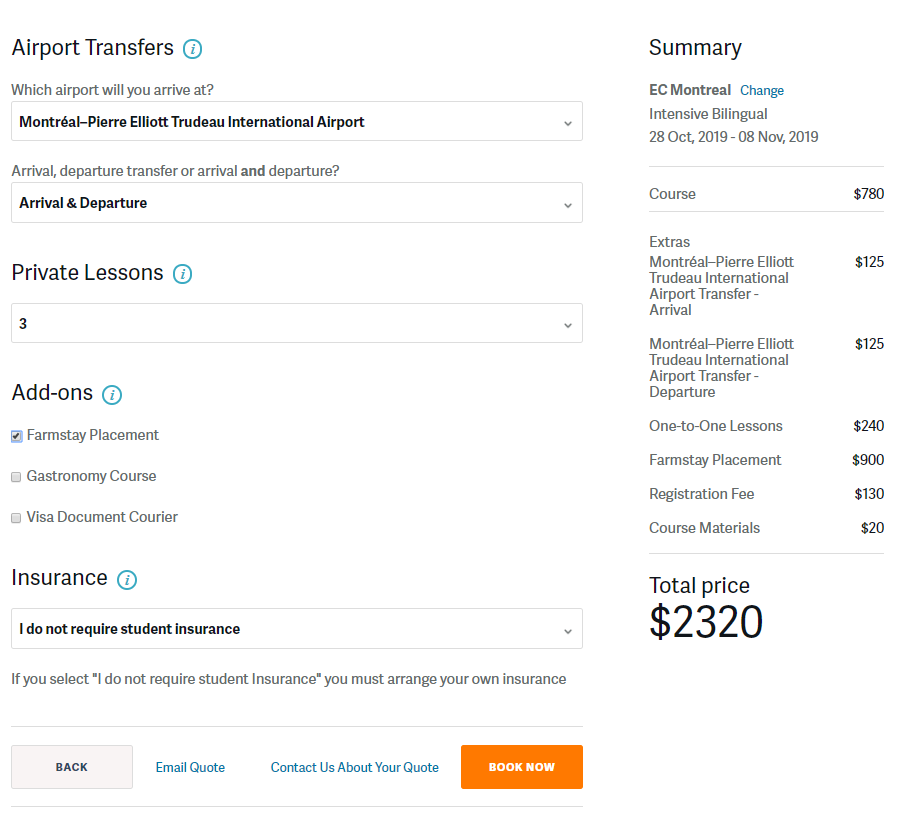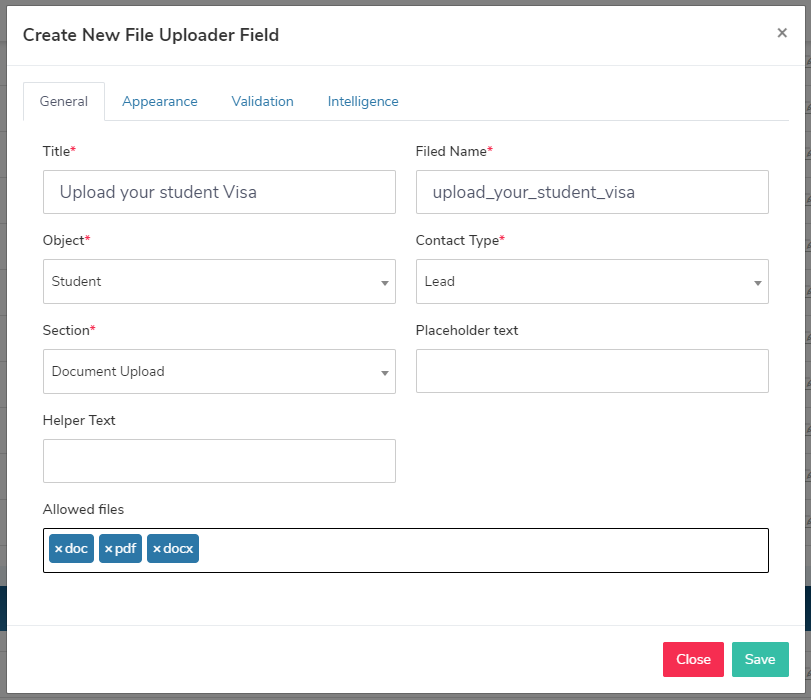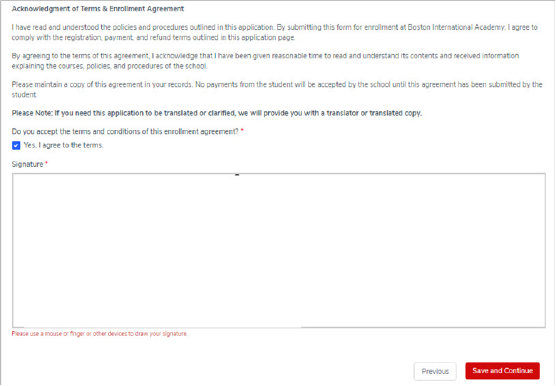
Crafting the perfect booking process is difficult for any school, but the Language School Booking Process encounters difficulties in offering students the experience they expect online.
Since language courses are not one size fits all – there are different classes, start dates, and optional extras to consider – it can be challenging to provide a language school online booking that is flexible enough to meet the needs of all your students. Language schools also have to cater to agents and parents who want to make bookings for multiple students, which can further complicate things.
However, with the right tools and features in place, your school can mitigate these issues and offer students as seamless an experience as possible. Keep reading to learn how to address seven common challenges schools in the sector often face.

Challenge 1: Providing Price Transparency for Language School Students
With so many different costs to bear for each booking, prospective language school students may not be prepared for the final payment. If you wait until this point to tell prospects the true cost of their program (including accommodation, exam fees, and any other extras), you risk catching them off guard and even dropping their booking entirely.
However, by offering an online quote generator on your website, you can provide full transparency in your pricing.
Example: Liden & Denz’s website features a quote generator in the foreground so prospects can easily explore the different program options available and plan their booking.

Offer a Path to Further Contact and Conversion
If you allow prospects to create quotes before they begin booking, they can take the time to figure out what options are right for them and contact your school if necessary before moving forward.
Example: At any stage in EC English’s multi-step quote builder, prospects can contact the school about their quote with a strategically placed CTA. They are also invited to book with an even more prominent Book Now CTA.

The above quote builder is a perfect example of how quotes can funnel prospects to enrollment while simultaneously making them feel more comfortable in the process.
Include all Options and Extras in Your Quotes
From accommodation preferences to additional activities to a whole host of different programs, language schools offer students a wide range of options to customize their perfect stay. However, all these choices can create headaches for prospects.
However, with a highly detailed quote tool, you can allow prospects to work out each aspect of their trip so there is no confusion when submitting their booking.
Example: LSI Institute’s quotes include information about their different courses, start dates, accommodations, and more. LSI’s quote builder is also responsive, meaning the options you select will determine which fields you must fill out. This saves prospects time while also making their choices much more apparent.

Adjust Your Quotes for Seasonality
Not only do language schools tend to have a long list of different booking options for prospects to choose from, but the prices also change based on the season. Since the summer tends to be busier for language schools, courses that start in June, July, and August are often more expensive, while classes in the winter months are generally cheaper.
Unfortunately, this can confuse prospects, who may expect low-season booking prices during the high season or vice versa. Worse still, if these costs aren’t included properly in your booking process, it could cause errors.
To mitigate this, not only should your quote builder include all possible costs, but the costs should reflect the season in which prospects intend to attend. Ensure your quote generator and booking forms automatically adjust prices depending on the course start date selected.
Example: HEM’s application portal includes a free quote tool that schools can use to customize their course prices for different periods.

By allowing prospects to see the total cost of studying with you before they begin booking, you make the process as transparent as possible and convert more leads.
Challenge 2: Digitizing the Language School Booking Process
After enabling prospects to plan out their perfect language program, the next step is helping to bring that plan to life by addressing the problems some prospects encounter when submitting their booking.
For starters, the very format of a language school booking can be a challenge. If your school still uses a paper application form, you’re making the booking process exponentially more difficult for prospects – especially considering that most language school students are international. Online booking forms rectify this issue, but digitizing every part of the booking process is easier said than done.
Since many language schools require several documents from prospects—such as visas, transcripts, and passports—your booking tool should include a document upload function compatible with different file formats, such as PDF, docx, jpeg, and more.
Example: HEM’s application portal makes online document submission easy. You can customize the perfect file uploader field in a few steps and select which file types you allow.

With HEM’s application portal, prospects can easily drag and drop their documents into their booking—significantly easier than sending them by post.

Another major digitization challenge falls at the very end of the booking process, namely, the signature.
Some language schools require prospects to print off their form, sign it, and re-upload it to the school’s site or to sign in person. However, doing so adds unnecessary extra steps that prolong and complicate booking.
However, language schools can obtain student consent in several different ways. To mimic a handwritten signature, prospects write out their names digitally. You could also ask prospects to type their names in a text box.
Example: You can enable e-signatures in HEM’s application portal to allow prospects to sign their name with their mouse cursor or finger.

By fully digitizing your forms, you simplify and speed up the booking process to the delight of your prospective students.
Challenge 3: Making Online Payments for Bookings
Online fee payment is another challenge of digitizing the language school booking process. However, language schools cannot solve the issue by allowing prospects to pay online with a credit card.
Since language school students come from all over the world, you likely have prospects in regions where transferring money online raises security concerns. Currency exchange rates and fees may also be a pain point.
To ease these issues, your online booking form should offer many different payment gateways so your prospects can pay their fees online and feel secure.
Example: HEM’s Application Portal is compatible with Stripe, PayPal, Helcim, and other widely used payment gateways, offering schools and prospects the option to arrange payments using whatever system suits them best.

Language schools may also want to consider offering prospects the option to pay in installments or allow students to make a deposit and pay the rest later. If you are going this route, HEM’s application portal can help you track the status of payments.
Flywire is a great option for allowing students to transfer their booking payments. This payment gateway is tailor-made for the education sector and can be easily integrated with HEM’s application portal.
Through Flywire, prospects can create payment plans to manage their course costs. The platform even offers a downloadable app for students to make payments on the go:

Flywire also secures wholesale exchange rates to make currency conversion easier and more affordable for users.
Challenge 4: Overcoming the Language Barrier
The language barrier is another unique challenge language schools face in booking.
While universities and colleges require applicants to be proficient in their language of instruction, language school prospects want to develop their linguistic skills. This means they may not be well-versed in your school’s primary language of instruction when they enroll.
This can pose problems when it comes to the booking process. If prospects don’t fully understand what they’re signing up for, they will likely encounter unexpected issues down the line – which your school’s staff will have to fix.
Translating your booking form into different languages prevents these problems and makes the booking process much easier for your prospects.
Example: Liden & Denz offers their booking form in English, German, Italian, and Russian.

Challenge 5: Parents Applying on Behalf of Their Children
Since many language schools offer programs for students under 18, parents will often want to apply on behalf of their children. But this can get tricky when parents start creating bookings for each of their kids – especially if you require users to create unique accounts for each booking.
To make things more convenient for parents, consider language school booking software that enables them to create their accounts in your application portal. This feature makes it much easier for parents to create and manage multiple bookings and for you to track their submissions.
Example: HEM’s application portal offers different accounts for prospects and parents, each offering different capabilities based on their needs.

Since parents are often a key persona for language schools, ensure your booking process is also tailored to them.
Challenge 6: Managing Language School Agent Applications
For many language schools, agents also play a crucial role in recruitment. Agents often create client bookings like parents, which can pose similar issues. It’s an even greater challenge for agents, considering that language schools also want to monitor agent activity closely, which is difficult if the booking is in a prospect’s name.
The challenge is similar to that of parents, and so is the solution: allow agents to create accounts in your student application portal.
Example: In the front end of HEM’s application portal, agents can create and manage multiple bookings from their accounts. The portal includes an agency section on the back end where your staff can invite agents, create profiles for different agencies, and monitor booking activity.

With agents being a lucrative part of your school’s outreach efforts, you want to ensure your application portal makes it as easy for agents to create bookings.
Challenge 7: Tracking Language School Bookings
Managing hundreds of bookings is daunting at the best of times, and the pressure only mounts during the high season.
If you want to track your bookings better and mitigate any chance of error, you’d best integrate your booking system with your CRM. That way, whenever someone submits a booking, a contact will automatically be created for them in your CRM database. If an existing contact books, their profile will update with the new information. This way, you can manage all your bookings in one place.
Example: HEM’s Mautic CRM makes it easy to track where your prospects are in the enrollment journey and follow up with them accordingly.

Marketing automation software can help you funnel leads toward booking and follow up with those enrolled by using automated workflows to communicate efficiently, timely, and personalized with your prospects.
Example: This email workflow encourages prospects to learn more about the school, discover the opportunities it offers, and eventually submit their booking.

As your bookings roll in, you can use CRM and marketing automation reporting to analyze how effectively your marketing efforts drive prospects to enroll.
Example: HEM’s Mautic CRM includes several detailed reports that offer ample insight into your digital marketing efforts. These reports let you see which channels are most effective at converting your leads.

Using these tools, you can closely analyze your efforts and continually update them for maximum success. After all, the more efficient your booking process is, the faster you convert leads and the more enrollments you generate.
By examining each aspect of your bookings and making every element as intuitive and comprehensive as possible, you not only avoid the above problems but also offer prospects another reason to trust your school with your bulletproof booking process.

FAQ To Consider
Are language schools profitable?
Since the summer tends to be busier for language schools, courses that start in June, July, and August are often more expensive, while classes in the winter months are generally cheaper.





